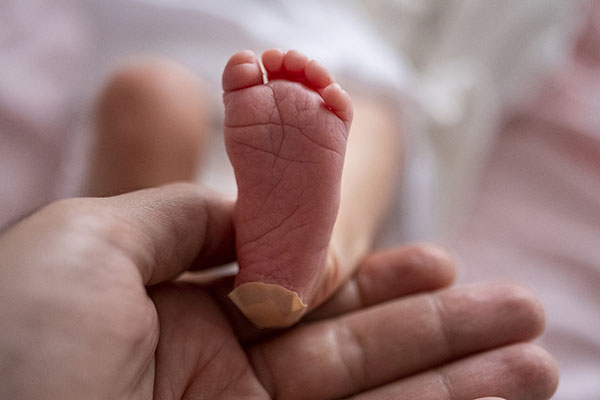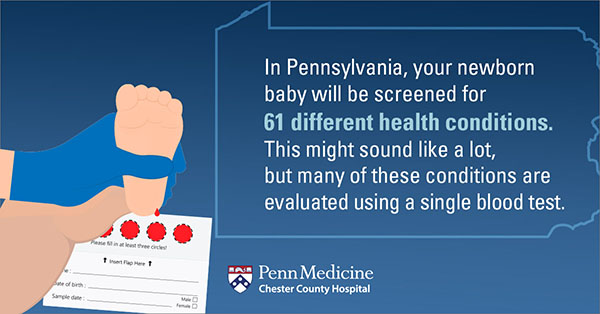
The day of your baby's birth is a day worth celebrating. Your family may take lots of pictures. You might receive gifts and well wishes from friends and loved ones. And when everything quiets down, you may just be grateful that your baby is finally here. It's a special moment that you'll cherish forever, and one that marks the beginning of a new chapter in your life as a parent.
Not only will your birthing experience itself be an exciting time, but your baby will also have a big first day — and that includes some newborn screenings.
 .
.
Newborn screenings are a key part of ensuring that your baby is healthy and developing properly. Here are a few of the health screenings your baby will experience during their first few days on Earth.
1. A Hearing Screening to Test for Hearing Loss
After your baby is born, they will have a hearing screening. During a hearing screening, an audiologist will do some special tests to check how well the baby can hear. Hearing screenings are done shortly after birth and don't hurt at all. Oftentimes, these tests can even be done while your baby is still sleeping.
There are two different kinds of hearing screenings: the otoacoustic emissions (OAE) test and the auditory brainstem response (ABR) test. An OAE measures the inner ear's ability to respond to sound, while an ABR measures the brain's response to sound. Both tests are non-invasive and painless, and can be done quickly and easily by a trained healthcare professional.
If the results of the hearing screening are abnormal, further testing may be needed to determine if there is hearing loss, what type, and how much, as well as what type of intervention may be necessary. "Finding hearing loss early makes a big difference in how well a child can learn to communicate," says Amy Latyak, BSN, RN, CCE, CBC, Childbirth Education Program Coordinator at Chester County Hospital. "Plus, it means your doctors can provide you with the right support, options, and resources to learn more about your baby’s communication needs and support their development."
2. A Pulse Oximetry to Measure Blood Oxygen Levels
Another kind of screening your infant will experience while still at the hospital is a pulse oximetry. A pulse oximeter will measure how much oxygen is in your baby's blood. This screening is important because low levels of oxygen can indicate a heart defect like congenital heart disease.
Testing for heart defects is key for catching and treating them early. Approximately 1% of all babies are born with a congenital heart defect, and an estimated 120 deaths are prevented each year because of newborn pulse oximetry screening.
A pulse oximeter works by placing a small sensor on your baby's foot and hand. The sensor will measure your baby's heart rate and blood oxygen levels for about 5 minutes.
3. A Blood Test to Screen for … Well, Everything Else
Other than these two unique tests (which look at very specific aspects of your baby's health), a blood test is used to screen for a wide range of health conditions. Typically done with a heel prick, your baby's first blood test will take just a few drops of blood that will be reviewed.
This blood test will check for disorders such as phenylketonuria (PKU), hypothyroidism, and sickle cell disease, among other hormonal, metabolic, and hemoglobin concerns. Early detection means early treatment — and better outcomes for your baby's health.
It can take a few days for the results of the heel stick to come back, so you and your baby may have already been discharged from the hospital. It's common not to hear back from your provider if everything in the tests came back normal, but ask your provider what to expect when it comes to communicating the results of these tests.
Let Chester County Hospital Welcome You — And Your Bundle of Joy
At Chester County Hospital, the health and well-being of your newborn comes first. That's why we offer comprehensive screenings as part of our standard care for all newborns. Our experienced staff will ensure that you and your baby are comfortable and at ease throughout the screening process.
It’s okay if the idea of newborn screening makes you a little nervous. You may be worried about being apart from your baby or what the results might be. But just know that newborn screening is a great way to give you peace of mind knowing that your baby's health is being monitored and addressed from day one.
Do you have questions about what to expect in the Chester County Maternity Unit? Call 610-738-2300 to connect with the Chester County Hospital Obstetrics and Gynecology Department or Find a Doctor Near You.